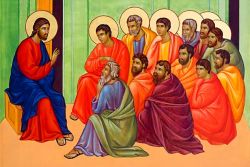June 30
The Apostolic College
On the day after the feast of Saints Peter and Paul, the Orthodox churches celebrate the Sinaxis of the twelve apostles. This commemoration is dedicated to all of Christ's closest companions and to the remembrance of how Jesus, seeing the crowds exhausted and like sheep without a shepherd, was filled with compassion and called the Twelve to himself in order to make them announcers of the good news with their works and their words.
The feast of the Apostolic College is thus an opportunity to remember that the Church is built on the foundation of the apostles, who are witnesses to the Risen Christ and the guardians of the Church's faith. The people of the new covenant recognize the apostles and their heirs in ministry as servants who build up unity and harmony in the Church community, through the ministry of the Word and the charisms of steadfastness and discernment.
All of these functions, however, are no more than the consequence of the apostle's primary vocation "to be with Jesus," to live with him and in him. Today's heirs to the apostolic ministry must remember this if they wish to guide men and women towards the one source of salvation, Christ, who is himself the Gospel, the good news of liberation addressed to every person.
The Evangelists themselves are the first to speak of the Apostolic College as a unity. This fact should serve as a reminder to the churches of today and tomorrow that there can be no credible announcement of the Word of reconciliation without a concrete testimony of harmony and goodwill, which must exist first and foremost among those who are vested with the apostolic ministry.
A READING
The apostles are not called for the primary purpose of repeating certain words and teachings of Jesus, learning a doctrine, or carrying a message to others. The first thing they are called to do is be with him. The apostles need to see what Jesus does and live with him, so as to bear him to others and reproduce his presence. In their life and preaching, they must speak about him unceasingly, so as to give a humanly evident sign of his presence.
(Carlo Maria Martini, from Bible and Vocation).
PRAYER
Lord our God,
you willed that your Church
be built on the foundation of the twelve apostles,
witnesses of the Risen Christ:
grant that we may remain faithful
to the faith they handed down to us,
and grant that their successors
may be united in one heart and mind as they guide
the people of the new covenant.
Through Christ our Lord.
BIBLICAL READINGS
Eph 4:1-13; Rom 10:12-18; Mk 3:13-19
The first martyrs of the Church of Rome (d. 64)
Today the Church of Rome commemorates its first martyrs. After a fire destroyed much of the city of Rome in the year 64, many Christians were thrown to the lions or burned alive by Nero, according to the historian Tacitus.
Today's commemoration is as ancient as the feast of Saints Peter and Paul, the founders of the Church of Rome. It has been celebrated on this date since 1923. In 1969 it was included in the general Roman Calendar, partly in compensation for the removal of almost all of the individual commemorations of Roman martyrs from the previous Roman calendar.
This commemoration reminds us that the Church, built on the foundation of the apostles and prophets, has grown as it has in large part because of the radical testimony of its martyrs, who died blessing those who put them to death out of hatred for their faith.
BIBLICAL READINGS
Rom 8:31b-39; Mt 24:4-13
Raymond Lullo (1232-1315) witness
In 1315 the erudite Catalan Raymond Lullo ended his long and fruitful earthly parable.
Lullo was born in 1232 into a noble family on the island of Maiorca, a land of meetings but also of frequent clashes among Jews, Christians and Muslims. He spent his entire life seeking to understand Islamic culture in its difference in order to offer its people the life-giving Gospel message.
In an era of violent battles, expulsions and massacres, Lullo always sought out the route of dialogue. He taught himself Eastern languages, studied the Arabic philosophical tradition, and made many trips along the North African coast, carrying no arms except those of his faith and intelligence.
He earned an international reputation as a theologian and philosopher. At the end of his life he was permitted to present his original theological method in the great universities of the era, thus receiving a partial recompense for the humiliation he had suffered at the hands not only of the Saracens but also of his fellow Christians, few of whom had understood him.
The circumstances in which Lullo died are unclear, but his death seems to have occured upon his return from one of his many voyages in Saracen territory. An extremely prolific writer, he left about three hundred works, which became important references for later scholars such as Nicolò di Cusa, Pico della Mirandola and Giordano Bruno.
Certain traditions about the last years of Lullo's life claim that he was received into the Franciscan Order and died a martyr. He is commemorated today by the Franciscans.
BIBLICAL READINGS
2 Cor 6:4-10; Jn 12:24-26
THE CHURCHES REMEMBER...
WESTERN CATHOLICS:
The first martyrs of the Church of Rome (Roman and Ambrosian calendars)
COPTS AND ETHIOPIANS (23 ba'unah/sane):
Abba Anub of Alexandria (3rd cent.), martyr (Coptic Church)
LUTHERANS:
Martyrs under Nero; Otto of Bamberg (d. 1139), bishop and evangelist in Pomerania
MARONITES:
The Twelve apostles
ORTHODOX CHRISTIANS AND GREEK CATHOLICS:
Synaxis of the twelve holy, glorious and illustrious apostles
Gelasius of Râmeti (14th cent.), bishop (Romanian Church)
Scialva Achalzicheli (d. 1227), martyr (Georgian Church)
WEST SYRIAN ORTHODOX:
The Twelve apostles
